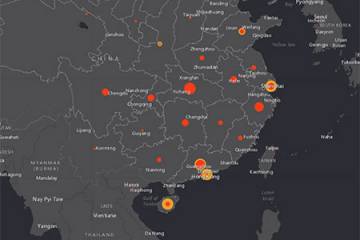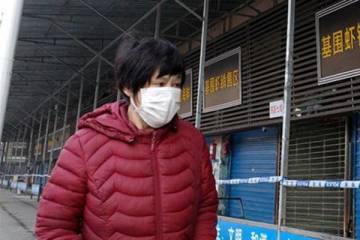Johns Hopkins today published and shared a novel coronavirus preparedness and response plan, a resource designed to "help protect our patients and their families, students, visitors, staff members, and communities" in light of the recent coronavirus outbreak in China.
As of Friday morning, there have been 881 confirmed cases of infection attributed to the virus, and 26 people have died. Coronavirus cases have been confirmed in at least six countries other than China, including two cases in the United States. Travel has been restricted for an estimated 40 million people in China.
The Hopkins coronavirus guidance was developed by the Office of Critical Event Preparedness and Response, or CEPAR, and shared in a message authored by Gabor Kelen, CEPAR's director and director of the Department of Emergency Medicine at The Johns Hopkins Hospital; Jonathan Links, vice provost and chief risk and compliance officer for the university; Robert Maloney, senior director of the Johns Hopkins Medicine Office of Emergency Management; and Lisa Maragakis, senior director of infection prevention for the Johns Hopkins Health System.
Their complete message is below.
To The Johns Hopkins Community:
Due to the rapidly evolving situation regarding the outbreak of 2019 novel coronavirus (2019-nCoV) in Wuhan City, Hubei Province, China, Johns Hopkins has developed a novel coronavirus preparedness and response plan to help protect our patients and their families, students, visitors, staff members, and communities.
Much of this plan relates to individuals who work in clinical settings for the Johns Hopkins Health System. However, university faculty, staff, and students should be aware of our institutions' guidance for people who could have been exposed to the virus. Further information related to any potential impacts on class or lab activities and student wellbeing will follow separately in the days to come.
In short, the guidance urges all Johns Hopkins faculty, staff, and students who have traveled to Wuhan and who develop respiratory symptoms or a fever within 14 days of returning to the U.S. to contact the student or occupational health office for a telephone consultation before visiting a Johns Hopkins affiliated clinic or emergency department.
The reason: Transmission modes for this virus are not yet well understood, but there is some evidence of human-to-human transmission. To be cautious, we would like to speak with returning travelers who are symptomatic so we can appropriately arrange their safe evaluation and treatment while minimizing the risk of exposing other people to the virus. There is much more to learn about 2019-nCoV, including how it spreads and the severity of the associated illness—investigations are ongoing, and early recognition of novel coronavirus is critical to contain its spread.
The guidance calls for patients visiting the emergency department or outpatient areas to be screened using the Wuhan novel coronavirus screening tool to assess patients' risk factors for the virus. The guidance also offers steps for faculty and staff to follow in the evaluation and care of patients with possible coronavirus.
While the Centers for Disease Control and Prevention considers this a serious public health concern, based on current information, the immediate health risk from 2019-nCoV to the general public in the United States is thought to be low at this time. However, the number of flu, respiratory syncytial virus, and other respiratory viral infection cases remains high in the U.S. Please stay home if you are sick, and remain there for 24 hours after a fever.
We greatly appreciate each of you taking the time to review this important preparedness and response plan. Following this guidance is the right thing to do as a member of an institution deeply committed to medicine and public health.
Sincerely,
Gabor D. Kelen, M.D.
Director, Johns Hopkins Office of Critical Event Preparedness and Response
Director, Department of Emergency Medicine
Emergency Physician-in-Chief, The Johns Hopkins Hospital
Jonathan M. Links, Ph.D.
Vice Provost and Chief Risk and Compliance Officer
Professor, Public Health, Medicine, Education, Engineering and Business
The Johns Hopkins University
Deputy Director, Johns Hopkins Office of Critical Event Preparedness and Response
Robert Maloney, M.S.
Senior Director, Johns Hopkins Medicine Office of Emergency Management
Associate Director, Johns Hopkins Office of Critical Event Preparedness and Response
Lisa L. Maragakis, M.D., M.P.H.
Senior Director of Infection Prevention, Johns Hopkins Health System
Associate Professor of Medicine, Johns Hopkins University School of Medicine
Senior Adviser for Infectious Disease, Epidemiology and Public Health, Office of Critical Event Preparedness and Response









